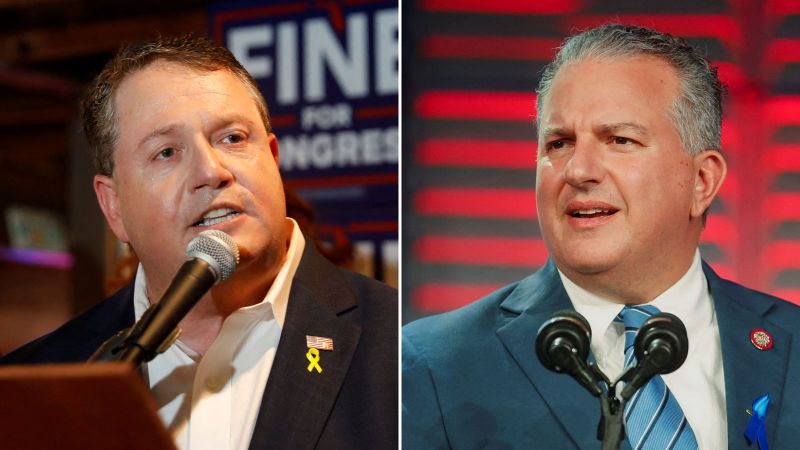
Republicans expanded their narrow House majority Tuesday with closer-than-expected wins in special elections in two ruby-red Florida congressional districts. The wins in Florida’s 1st and 6th Districts — seats that opened when President Donald Trump plucked former Reps. Matt Gaetz and Mike Waltz from districts he won by more than 30 percentage points last year for roles in his administration — allowed the GOP to breathe a sigh of relief Tuesday night.
But the party’s shrinking margins in Florida could also be an ominous sign ahead of next year’s midterm elections, when a majority that grew from five to seven seats on Tuesday will be on the line. Polls in Florida closed earlier than those in Wisconsin, where a high-stakes state Supreme Court race — one where Trump ally Elon Musk has played a central role in seeking to drive up turnout — is expected to offer a window into how voters in a marquee swing state view the president’s performance so far. Here are three early takeaways from Tuesday’s contests: GOP’s growing margins For House Speaker Mike Johnson, wins by Republicans Jimmy Patronis in Florida’s 1st District and Randy Fine in the 6th District mean more breathing room to advance Trump’s agenda.

Johnson’s House majority is so slim that Trump was forced to pull his nomination of New York Rep. Elise Stefanik for US ambassador to the United Nations to avoid a special election in a solidly red district. “We have a slim margin.
We don’t want to take any chances. We don’t want to experiment,” Trump said last week. Losses in Florida would have ignited full-blown panic on Capitol Hill — and made Johnson’s task of keeping together an ideologically fractured caucus even more difficult.
The GOP averted that potential disaster. But the smaller-than-expected margins during Tuesday night’s special elections could still leave congressional Republicans nervous, and are likely to serve as a wake-up call for those representing even nominally competitive districts. Democratic overperformance Although Republicans won both special elections in Florida and shored up their party’s narrow majority in the House, the races grew more competitive than expected in the stretch to election day with the Democrats raising significant sums.
And Tuesday’s results offered some warning signs for the party. In districts Trump won by at least 30 points less than five months ago, both Democratic contenders cut those margins by roughly half, early results show. Fine, in Florida’s 6th District, won by fewer than 14 percentage points after being outraised 10-to-1 by his Democratic opponent Josh Weil, a teacher.
“Congratulations Randy, a great WIN against a massive CASH AVALANCHE,” Trump wrote on his Truth Social platform Tuesday night. For GOP incumbents in battleground seats seeking reelection next year, the narrow margins in these deep-red Florida districts could serve as a potential warning sign of a tough midterm environment if Democrats are able to sustain their enthusiasm in opposition to Trump, Musk and the Republican agenda. Trumpification of Florida A year after his public and contentious civil war with Republican Florida Gov.
Ron DeSantis came to an end, Trump once again made clear who controls the GOP in his home state. Trump dictated the outcome of the Republican races to replace Gaetz and Waltz with his endorsement – elevating two candidates in Patronis and Fine who had loose ties to the districts they were tapped to represent. No matter, both sailed to victory in their primaries.
Despite the closer-than-expected outcomes Tuesday, he now has two loyalists in Congress who owe their ascension almost entirely to Trump. DeSantis, meanwhile, declined to endorse both Trump-backed nominees, didn’t lift a finger to help the GOP maintain its majority and trashed Fine as an objectionable candidate just as Republican panic over the race was reaching a crescendo. Fine and Patronis will now migrate to Washington where Trump has orchestrated a Florida takeover of federal government by leaning on Republicans who two years ago backed the president over their home state governor during the Republican presidential primary.
His chief of staff, Susie Wiles, is a former DeSantis operative as is top White House political adviser James Blair. Trump named Waltz his National Security Adviser and the state’s ex-Sen. Marco Rubio as his secretary of state.
When the nomination for Panhandle Republican Gaetz to lead the Department of Justice faltered, Trump turned to Florida’s former attorney general, Pam Bondi. Some of Trump’s top fundraisers are Sunshine State lobbyists who are leveraging their connections to sign up a roster of clients looking to sway the new administration. Publicly, Trump and DeSantis remain on solid terms.
But the latest touchstone in their ongoing rivalry comes as the president is already looking to leave his mark on next year’s gubernatorial race in Florida. Trump made an early endorsement of Rep. Byron Donalds even as DeSantis’ wife, Casey DeSantis, has taken steps toward her own race to succeed her husband.
Tuesday’s results make clear Trump’s brand remains strong with the state’s base. Republicans credited Trump’s late involvement for the surge of support for Fine on Election Day that ultimately carried him over the finish line. So did the Democrat.
“The President of the United States had to break into his schedule,” Weil said, “to drag (Fine) across the finish line.” Wisconsin adds voter ID to state constitution A GOP-backed referendum to enshrine Wisconsin’s voter ID requirement in the state Constitution passed overwhelmingly Tuesday, even as voters kept the state Supreme Court in liberals’ hands. Wisconsin voters have been required to present a photo ID when requesting an absentee ballot or voting in person since 2011.
But Tuesday’s referendum will make it harder for any future Democratic majority in the state to repeal those laws and protect the requirement from legal challenges. Supporters of voter ID laws argue that they prevent fraud and maintain trust in election integrity. Opponents say they make it harder for some – especially low income and disabled voters – to cast ballots and have been used to disenfranchise people.
Democrats urged voters to oppose the measure, as did nearly two dozen civil rights groups, including the Wisconsin chapters of the ACLU and the League of Women Voters. But despite the opposition, voter ID laws are popular in the state. A February Marquette University Law School poll found that 73% of Wisconsin voters supported adding the voter ID requirement to the state Constitution.
.








_8.jpg?itok=wp-xhXRB)





